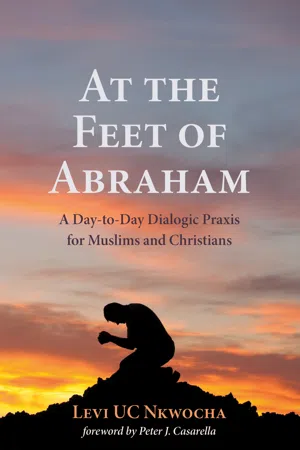
At the Feet of Abraham
A Day-to-Day Dialogic Praxis for Muslims and Christians
- 350 pages
- English
- ePUB (mobile friendly)
- Available on iOS & Android
About This Book
This book advances an Abrahamic "asymmetric-mutual-substitutive" model of hospitality as a practical approach to establish peaceful coexistence between Muslims and Christians. The merits include its helpful survey of the four models of interfaith dialogue and its clear exposition of the dialogue of life; its constructive use of the philosophy of Levinas, particularly in supporting its vision of asymmetrical moral responsibility among Muslim and Christians; and its familiarity with an extensive philosophical literature on alterity, gift-exchange, and responsibility. The research also demonstrates strong command of the relevant Christian and Muslim scriptures and Catholic teaching on interfaith relations, in addition to a wide range of background material on African Ubuntu spirit, visible in Nigerian sociocultural and religious interdependent relations. Through a consistent engagement of these philosophical, ethical, and cultural dimensions, the Abrahamic theology of hospitality is ingeniously crafted to fill the age-old gap--mutual inability to deal with religious otherness. At once, the book provokes further scholarship inquiries on and around the identified concerns. Its commonness and concreteness, with the proposed respect for each other's faith commitment, further underscores its quality.
Frequently asked questions
Information
The Problem
Table of contents
- Title Page
- Foreword
- Preface
- Acknowledgments
- Abbreviations
- Introduction
- Chapter 1: The Problem
- Chapter 2: Mismanaged Problem
- Chapter 3: Contextual Rivalry
- Chapter 4: Inadequate Reactions to Religious Otherness
- Chapter 5: The Development of Positive Views
- Chapter 6: Dialogue of Life as Faith Witnessing
- Chapter 7: The Hospitality Key
- Chapter 8: Hospitality and the African Communality
- Chapter 9: Hospitable Coexistence
- Chapter 10: Hospitality
- Chapter 11: The Abrahamic Model
- Conclusion
- Bibliography